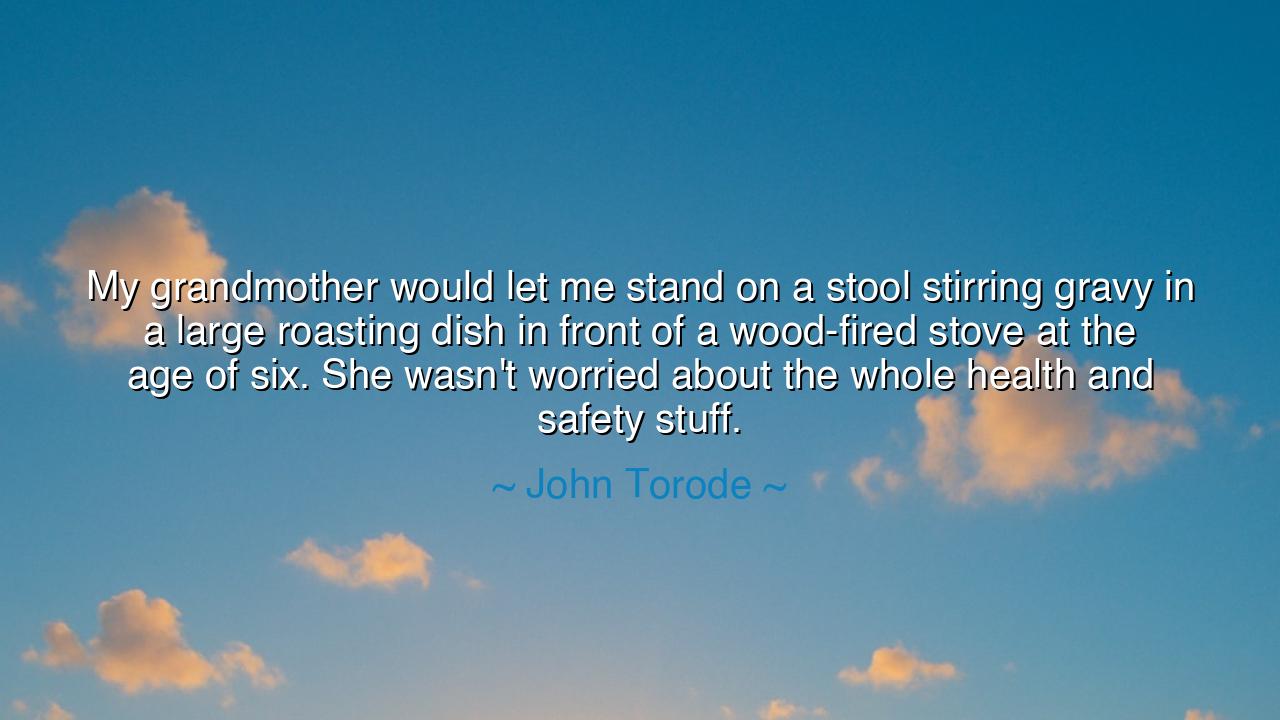
My grandmother would let me stand on a stool stirring gravy in a
My grandmother would let me stand on a stool stirring gravy in a large roasting dish in front of a wood-fired stove at the age of six. She wasn't worried about the whole health and safety stuff.






In the words of John Torode, “My grandmother would let me stand on a stool stirring gravy in a large roasting dish in front of a wood-fired stove at the age of six. She wasn't worried about the whole health and safety stuff.” These words, though humble, carry the weight of an age that is vanishing—the age of trust, courage, and simplicity. Torode, the celebrated chef, is not merely recalling a childhood memory; he is invoking a lost philosophy of life. In his grandmother’s kitchen, amid the warmth of a wood-fired stove and the scent of roasted food, a sacred lesson was passed down: that learning, creation, and growth are born not in safety, but in participation.
To stand on a stool stirring gravy at the tender age of six is to stand at the threshold of discovery. It is to be trusted with something real—heat, risk, responsibility. The grandmother’s lack of fear was not negligence, but faith. She believed that children learn best not through walls of caution, but through the touch of experience. In her world, a burn or a spill was not disaster, but education. Each moment in that kitchen was a communion between generations—a passing of knowledge not through books or screens, but through hands, smells, and the rhythm of real life. The boy stirred more than gravy that day; he stirred the beginnings of his destiny.
In ancient times, such lessons were the heartbeat of every household. The Greek philosopher Aristotle taught that virtue is not learned through words, but through habit and practice. The child who is never allowed to fail, he said, will never learn courage; the one shielded from all risk will never understand mastery. Torode’s grandmother lived by this ancient truth. She did not fear the stove or the flame; she trusted that a child, given responsibility, would rise to meet it. This is the old wisdom of the hearth—the understanding that life’s most precious skills are passed down not through perfection, but through participation.
The story of Julia Child, the great culinary icon, echoes this same truth. She did not begin cooking until her late thirties, yet her first attempts were filled with spills, burns, and broken dishes. Instead of discouragement, she treated each mistake as a teacher. It was through imperfection that she achieved mastery. The lesson is clear: whether one is six or sixty, the art of creation requires contact with reality, not the sterile distance of fear. We cannot learn to cook without heat, nor learn to live without risk.
Torode’s words also speak of a world now overshadowed by the tyranny of “health and safety.” Our modern age, in its quest to protect, has often forgotten how to trust. Children are kept from fire, from knives, from the very elements that once taught discipline and awareness. Yet safety without struggle breeds fragility. The grandmother’s wisdom lies in her balance: she did not abandon caution, but she refused to let fear rule her home. Her kitchen was not a danger zone—it was a temple of trust, where a child’s confidence was forged alongside his skills.
There is beauty in such freedom, for it awakens the senses and strengthens the soul. The warmth of a wood fire, the scent of gravy, the sizzle of fat—all these things remind us that learning is not a sterile act. It is sensual, alive, and sacred. To touch the world, to feel its weight and warmth, is to belong to it. The grandmother knew that the child who learns to stir the pot learns also to face life’s heat—to be patient, attentive, and brave. These are the foundations not only of a good cook, but of a good human being.
The lesson, my child, is this: do not fear the flame. Whether you are raising a child or seeking to grow yourself, let experience be your teacher. Do not overprotect the young, for in denying them the chance to err, you deny them the chance to grow. Let them touch the world, feel its texture, and make their mistakes under the warmth of your watchful care. And for yourself, return to the places where you once learned without fear—the kitchen, the workshop, the soil. For it is in these humble places that confidence is kindled, creativity is born, and life’s truest lessons are stirred into being.
So remember John Torode’s grandmother, standing quietly by the stove as the boy learned to stir. In her patience and trust lay the secret of all great teaching: to let the flame touch the hand, so that the hand may one day master the flame.






AAdministratorAdministrator
Welcome, honored guests. Please leave a comment, we will respond soon